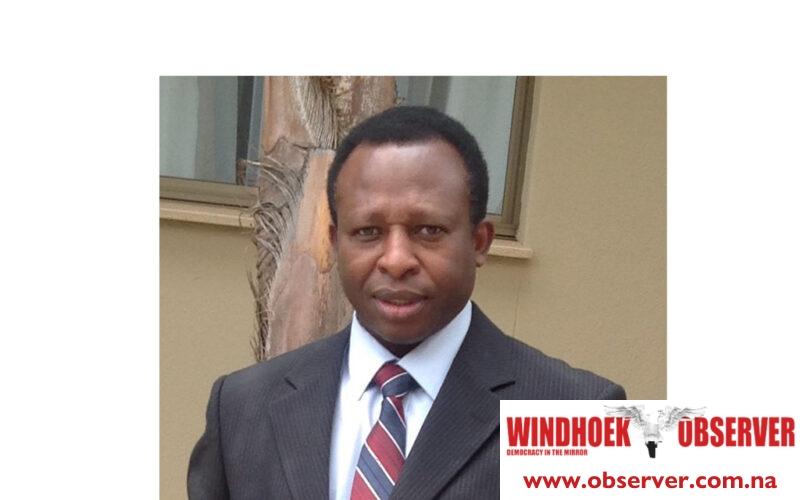Erasmus Shalihaxwe
Fly Etosha accounts manager Captain William Ekandjo, is upbeat that Fly Etosha Airways will take to the sky in mid-November this year to revolutionise the aviation business and nobody can stop it.
During an interview with the Windhoek Observer yesterday, Ekandjo said Fly Etosha could have been flying already was it not for the sabotage and organised interference the airline suffered.
Earlier this year, Fly Namibia Aviation objected to the granting of air transport service licence of Fly Etosha Airways, however, the objection was later withdrawn after public criticism of Fly Namibia.
Ekandjo told this publication yesterday that the aviation industry is challenging with lots of competition, and if one is not ready to compete then is best to move out. But Fly Etosha’s intention is to help the industry and not to fight anyone.
“It is true that Namibia lack air transport infrastructure and anyone offering a hand should be welcomed we believe. We are inviting all local companies and individuals to join us before running away to call for collaboration in South Africa because we have trust in the Namibian people. We advocate Namibians to work together to create synergy to become powerful,” he said.
He said the airline managed to raise starting capital but not sufficient enough to completely do what they wanted to do. Ideally, with enough funding, the company can improve its fleet requirement to six or eight aeroplanes, but due to lack of funds they have to stick to a low operation which is fine for the time being.
“Capital to start an airline is never enough and depends on your operational model and how big you want to start. In our case, we are planning to start small with four aeroplanes, two with a seating capacity of 50 passengers and two with 80 passengers. The other thing is also whether you want to buy aeroplanes or lease them. Our requirements start from N$ 120 to N$ 220 million.
Since we want to grow bigger, we are still looking for investors locally and internationally. We are the only airline in Namibia that has experienced personnel to run a complex airline capable of operating overseas safely. We have done it in the past and we shall continue to do so but under a different name,” he explained.
Ekandjo also stated that Fly Etosha has enough experienced employees as most of them were part of Air Namibia, ranging from engineers, Professional Cabin Crew members and Pilots, even though many have gone out of the country in search of work.
“I have no doubt that many employees are able to return back home as soon as there is work available. Obviously, people are displaced because of suffering and having nothing to provide for their families,” he stressed.
Ekandjo strongly believes that there is plenty of potential in the Namibian aviation industry, however, people need to get out of the Namibian tendency of selfishness and individualistic mentality. Because Aviation is expensive and industry players need to collaborate to form synergy that can grow the industry.
“What we are busy doing is the standard way of doing business in Namibia, for example, staggering car wash business from neighbour to neighbour, Cuca shops or Tuck shop in the whole neighbourhood instead of forming together something tangible.
We need to get out of these mentalities to work together positively to grow the Namibian economy. I don’t think that there is anybody happy with the air transportation system in Namibia, and this is why we need to work together,” he advised.
He further stated that Fly Namibia is revolutionising how aviation business is done because Namibia is a country with a fast-growing economy with a stable political platform.
This gives Fly Etosha an unsatisfied appetite for growth and thus invites local and international investors to share the cake.
“We understand that starting an airline requires significant investments, but with our air transport industry experience and years in airline management and operations of international airlines, coupled with years of dealing with foreign airlines, aviation business models, aviation services and access to cutting-edge technology and analysis, we are confident that this endeavour will be profitable for all parties involved,” he said.
The aviation guru stated that previous experience, has taught them to understand the game better and they have made changes in the program of doing aviation business in Namibia. Because they have opened their eyes and realised how things are done in the granting of aviation licenses in Namibia.
“Obviously everybody has seen how uneven the playing field is on qualifying for the license. Unless there are changes made around the fairness of granting a license, we shall not go back there. There are several ways to go about license issues and the one we have chosen is to partner with an entity having such a license.
As we speak, we are in partnership with those brothers and sisters that have licenses which is best to circumnavigate corruption. Unity makes people and institutions stronger and therefore collaboration is the best way to handle problems, especially in the aviation competitive environment,” he stressed.
Fly Etosha will use plans to fly the same routes flown by Air Namibia before, by having daily flights to Johannesburg and Cape Town while operating three times per week to Maun and Victoria Falls. Four times per week to Luanda while Gaborone, Lusaka and Harare will be served twice a week.
On the domestic side, Ondanwga will be served 11 rotations per week while Rundu and Katima Mulilo will be served four times a week. Walvis is to be operated five times a week while Luderitz and Oranjemund will be served three times a week.
“Please note that frequencies shall be increased based on the number of aeroplanes acquired. Other routes to be developed are Keetmanshoop, Opuwo, Khorixas, Tsumeb and Okakarara,” Ekandjo concluded.




